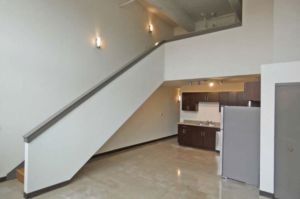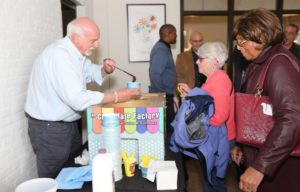“I first drove by here seven years ago, and I thought, ‘I’d like to tackle that building,” said David Block, Director of Development for Evergreen Real Estate Group.
Block stood before an excited crowd that gathered in May to celebrate the completion of Milwaukee’s Legacy Lofts. The Lofts comprise a 64-unit, $13.9 million housing development financed by a host of public and private entities, including IFF. The project is the tenth that IFF and Evergreen have worked on together to advance the two organizations’ shared goal of increasing high-quality affordable housing across the Midwest. It also adds to the more than $100 million in loans and new market tax credits that IFF has provided to nonprofits and affordable housing developers in Wisconsin since 2006.
Evergreen not only meticulously rehabilitated the historic building Block spotted back in 2012 – the former Blommer Ice Cream Factory, which closed several decades ago and sat unused for the past 20 years – but expanded into an adjacent lot, pairing the 1928 structure with a new building to house additional apartments. Fifty-four of the units are for renters earning less than 60% of the area median income, and the remaining 10 units are unrestricted.
 Community interest and support have been high from the outset. Eric Meyer, the Evergreen project manager who helped shepherd the complex to completion, recalls, “When we weren’t even close to being done, employees from the grocery store across the street came over and asked, ‘Do you have any flyers we can hand out? People keep asking us how they can get to live in the building.’”
Community interest and support have been high from the outset. Eric Meyer, the Evergreen project manager who helped shepherd the complex to completion, recalls, “When we weren’t even close to being done, employees from the grocery store across the street came over and asked, ‘Do you have any flyers we can hand out? People keep asking us how they can get to live in the building.’”
Now that the Lofts are completed – and already fully rented – residents can enjoy them. Several joined the May celebration. “I have zero complaints,” said one with a smile, her pet terrier tucked under her arm. Others gave tours of their units, which boasted soaring windows, sparkling new kitchens, and open-concept living rooms with ample room to entertain.
In addition, the building’s responsive management, transit-friendly location, and thriving community have received high marks. As another resident noted, “We look out for each other here.”
“Here” refers not just to the building, but the broader Lindsay Heights neighborhood. Situated on Milwaukee’s near North Side, Lindsay Heights became a key stop on the Underground Railroad in the 1840s. By the 1920s it was a destination point and entrepreneurial hub for African Americans participating in the Great Migration – including Bernice Lindsay, a champion of human rights for whom the neighborhood was renamed in the late 1990s.
This development [Legacy Lofts] goes along perfectly with all the economic and social momentum we’ve got going on in this community … It’s all being done with the community in mind.

Larry Adams (left), Alderman Stamper (center), and Sharon Adams (right) played key roles ensuring that the Legacy Lofts were built with the community in mind.
Larry and Sharon Adams are among today’s community leaders who have followed in Lindsay’s footsteps. The couple recently retired from Walnut Way, the grassroots community development nonprofit they founded in 2000 to help “bring investment back to the North Avenue Commercial Corridor” following a spate of challenges, such as lost manufacturing jobs, that the neighborhood has faced in more recent decades.
The Adams’ efforts to tap into and advance Lindsay Heights’ entrepreneurial heritage are working – and spreading. The Legacy Lofts are within walking distance to a new Save-A-Lot grocery store, coffee and smoothie shops, and a flourishing restaurant, Tandem, which employs Lindsay Heights residents and features a menu that was built based on community input. Other neighborhood anchors include the Wisconsin Black Historical Society/Museum and the near North location of the St. Ann Center for Intergenerational Care – which, along with the nearby Save-A-Lot, was also partly financed by IFF.
As Alderman Russell W. Stamper II, who said he grew up riding his bike up and down North Avenue, noted, “This development [Legacy Lofts] goes along perfectly with all the economic and social momentum we’ve got going on in this community … It’s all being done with the community in mind.”
According to both Stamper and Block, the Adams played an invaluable role in the Legacy Lofts project. “Sharon and Larry really helped us understand what this neighborhood is all about and what is important to its residents,” Block said. “Reminding us of those priorities the way they did was key in following the path to get to where we are today.”
The couple continued to provide critical reminders at the ribbon-cutting. “The process is what’s really important – not just the celebration of the end result,” said Larry Adams. “Ethics and goodwill have to be put first.”
Sharon Adams then asked residents to join her at the podium. “Their stories underlie everything that we’re doing,” she said. “Housing matters because the people living in the houses matter.”
‘Success has many parents’
Legacy Midwest Renewal Corporation (LMRC) founder Sally Peltz was also integral to the project’s success. In addition to leasing office space on the new building’s ground floor, LMRC helped Evergreen piece together an intricate public-private financing solution that combined federal low-income housing tax credits, state and federal historic tax credits, tax-increment financing, HOME Fund financing, and private mortgage debt.

Attendees of the Legacy Lofts ribbon-cutting were treated to ice cream in honor of the building’s original use by the Blommer Ice Cream Factory.
“Legacy Lofts at the Blommer Ice Cream Factory is a dream come true,” Peltz said at the ribbon-cutting, explaining that “it took both traditional and creative financing” to make that dream a reality. She also congratulated the strong Lindsay Heights neighborhood, determined developers, and stalwart backers from local and state government.
Milwaukee Mayor Tom Barrett, who was on hand for the event, echoed Peltz’s focus on partnership. “Success has many parents,” he said.
Other behind-the-scenes “parents” who helped make Legacy Lofts a reality included Continuum Architects + Planners, Greenfire Management Services LLC, MacRostie Historic Advisors, HN Development, Walnut Way Development Corp., Haywood Group, the Wisconsin Housing and Economic Development Authority (WHEDA), the city of Milwaukee, the Wisconsin Historical Society, US Bank, and Associated Bank.
For its part, IFF provided a $1.4 million construction loan in partnership with WHEDA, as well as a $250,000 predevelopment loan to keep the project moving.
IFF also stepped in to address an unanticipated funding gap that threatened to thwart the project in 2016. The uncertainty triggered by that year’s presidential election – and the tax reforms people expected would follow – caused the price that outside investors typically pay developers like Evergreen for federal low-income tax credits to drop markedly. That triggered the need for additional funding sources. As a Federal Home Loan Bank of Chicago member, IFF was able to provide $750,000 in Affordable Housing Program funds to help close the gap.
Housing matters because the people living in the houses matter.
“The unconventional financing structure that IFF participated in was really important,” Evergreen project manager Eric Meyer says. “We’re very thankful that IFF helped work that out.”
The gratitude and respect are mutual. According to Stephanie Socall, IFF’s Director of Affordable Housing, “There’s a reason we’ve worked with Evergreen on 10 different housing projects spanning Illinois and Wisconsin. They’re both creative and incredibly persistent in their pursuit of quality affordable housing – and the Legacy Lofts are a prime example of that.”